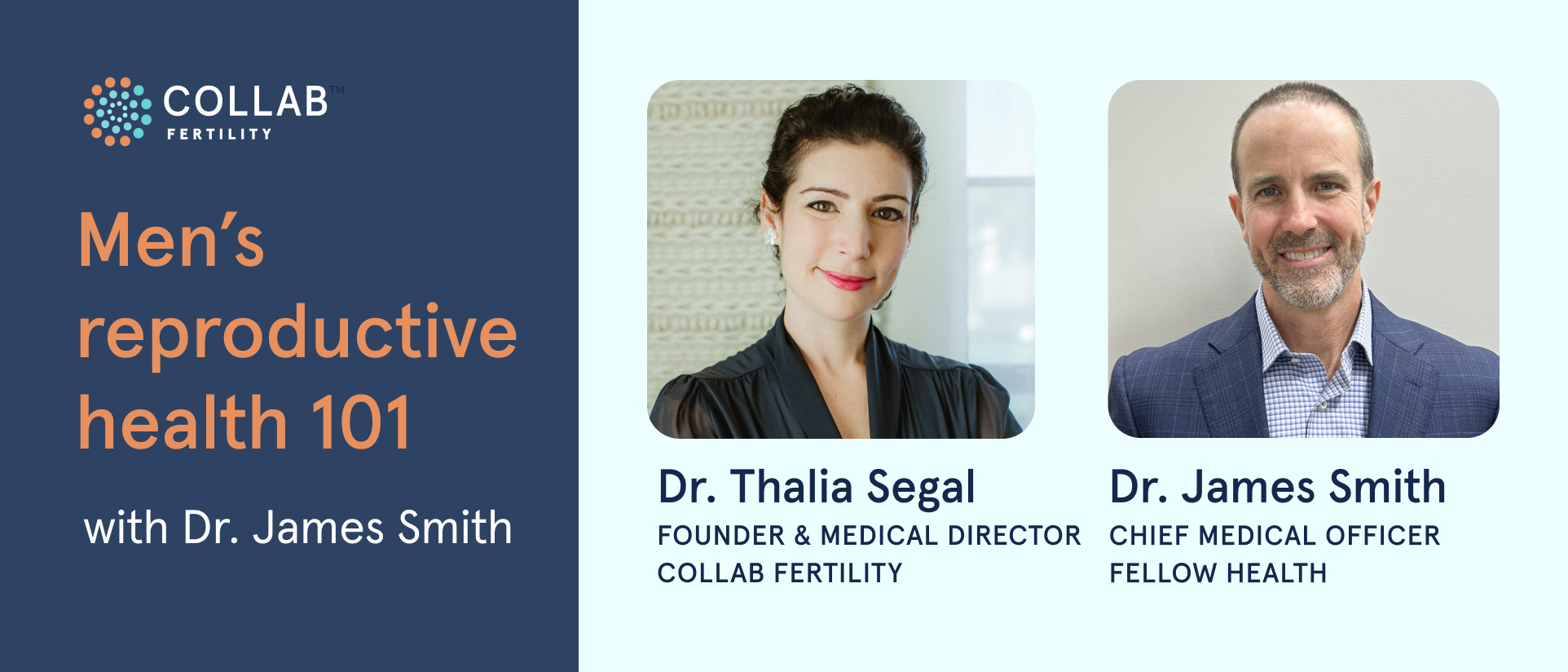
Do cannabis and vaping cause low sperm counts?
In a world where wellness trends come and go, one thing is clear: when it comes to fertility, men’s habits matter just as much as women’s. If you and your partner are hoping to conceive, stepping back from cannabis and vaping is one of the simplest ways to protect your sperm health.
Nearly 50% of all infertility cases involve a male factor, yet many men aren’t routinely evaluated when a couple is trying to conceive. Meanwhile, global sperm counts have declined by more than 50% over the past four decades, according to large-scale meta-analyses led by environmental and reproductive epidemiologist and Collab partner Dr. Shanna Swan. These trends underscore how modern lifestyle and environmental factors—from stress and diet to toxin exposure and substance use—can shape reproductive health.
At Collab Fertility, we believe it’s essential for men to get tested early and make informed lifestyle choices to maximize sperm health and overall fertility potential. Our approach, known as The Collab Way, combines compassionate care with evidence-based science to help both partners understand their unique fertility profile and take proactive, sustainable steps toward healthy conception.
Cannabis and fertility: what the terms actually mean
Cannabis
The umbrella term for the Cannabis sativa plant. It includes all forms of the plant (flowers, oils, extracts) and all compounds found within it.
Marijuana
A type of cannabis that contains significant levels of THC and produces psychoactive effects (the “high”). The term is commonly used to describe cannabis products designed for recreational or medicinal use that alter consciousness.
THC (tetrahydrocannabinol)
The primary psychoactive compound in cannabis. THC is responsible for the intoxicating effects and can impact hormones, sperm production, and overall reproductive function.
CBD (cannabidiol)
Another compound found in cannabis, but non-psychoactive. CBD does not cause a high and is often marketed for stress, pain, or sleep support. While CBD is generally considered less harmful to fertility than THC, research is still evolving, and purity of products varies widely.
Can CBD affect sperm?
CBD (cannabidiol) has become a wellness buzzword, promoted for stress relief, pain management, and sleep support. However, when it comes to fertility, research is still catching up. While CBD doesn’t contain THC (the psychoactive compound in cannabis), it interacts with the same endocannabinoid system that plays an important role in reproductive function. Both sperm and testicular tissue have cannabinoid receptors, suggesting that even non-psychoactive cannabinoids could influence sperm development or hormone balance.
Human studies are limited, but animal data provide a warning: in some models, high-dose CBD exposure has been linked to reduced sperm motility and altered testicular structure. Because evidence is incomplete, most fertility specialists take a precautionary approach.
Does marijuana affect sperm?
Yes, marijuana affects sperm, and this is where most of the research lies. Multiple studies and reviews have linked cannabis use to measurable declines in sperm quality, including count, motility, morphology, and DNA integrity.
- A systematic review found that cannabis use was “strongly associated with reductions in sperm count and concentration” in both animal and human studies (Human Reproduction Update, 2020).
- A Duke University study found that cannabis use may cause epigenetic changes in sperm—altering gene expression in ways that could potentially influence embryo development (Epigenetics, 2019).
- Another study reported that men who used cannabis within three months of providing a sample were nearly twice as likely to have abnormal sperm morphology compared with non-users (Human Reproduction, 2015).
- A large Danish study of more than 1,200 men found that those who used cannabis weekly had about 28% lower sperm concentration and 29% lower total sperm count compared to men who had never used it. Even occasional use can impact sperm quality temporarily. (American Journal of Epidemiology, 2015)
Notably, THC, the main psychoactive compound, appears to disrupt the endocannabinoid signaling critical for sperm maturation and function. Sperm exposed to THC show reduced motility, impaired fertilization capacity, and changes to the molecular makeup that may influence early embryo health.
At our East Bay Fertility Clinic, Collab Fertility, we believe that understanding these biological effects empowers men to make informed choices. Through The Collab Way, we help clients take control of lifestyle factors, such as substance use, nutrition, toxin exposure, and sleep, to restore balance and improve reproductive outcomes.
Does vaping affect sperm?
Vaping is often perceived as a safer alternative to smoking, but emerging research suggests otherwise, especially for sperm health.
- A cross-sectional study from Denmark found that daily e-cigarette users had significantly lower total sperm counts (91 million) compared to non-users (147 million) (Human Reproduction, 2020).
- Another review concluded that exposure to e-cigarette aerosols can damage sperm cells, impair motility, and affect testosterone regulation in animal models (Reproductive Toxicology, 2023).
E-cigarette vapor may contain nicotine, heavy metals, and aldehydes, all compounds known to harm sperm production and DNA integrity. Though vaping may reduce some of the toxins found in conventional cigarettes, it’s not risk-free.
How long after quitting weed does male fertility improve?
Here’s the hopeful news: sperm regenerates roughly every 74 days, which means improvement is possible within just a few months of quitting cannabis. Research from Duke University found that after about 11 weeks (77 days) of abstinence, many of the cannabis-related epigenetic changes in sperm were no longer present.
Animal research echoes this, showing that discontinuing THC exposure can reverse testicular and hormonal changes linked to reduced fertility.
While timelines can vary based on how long and how often someone used cannabis, a good first step is to get a baseline semen analysis with us. From there, our team and our male fertility specialist partners can guide you on the next steps and support strategies to help improve your chances of success.
Conclusion
If you’re trying to conceive, the evidence is clear: avoiding cannabis, CBD, and vaping is one of the most powerful steps you can take to support sperm health. The good news is that many of these effects are reversible with time, awareness, and lifestyle change. We’re here to help guide that process.
We believe men’s fertility deserves the same level of attention and care as women’s. Through The Collab Way, we combine cutting-edge reproductive medicine with integrative, evidence-based support, helping men and couples identify modifiable factors, reduce environmental exposures, and optimize fertility naturally.
For those ready to take the next step, we offer same-day fertility testing at our Walnut Creek fertility clinic. Testing evaluates key parameters such as sperm count, motility, morphology, and volume. Results are reviewed the same day, and every patient receives a personalized treatment plan based on their age, fertility status, and family goals.
You can provide your sample on-site, or—if you live within one hour of the clinic—drop it off after collection at home for added convenience. Our team also collaborates with leading male infertility specialists who can address most abnormal semen analyses through targeted guidance, lifestyle interventions, and when necessary, advanced medical treatment. In our clinic, we can perform multiple methods of surgical semen extraction and aspiration when indicated.
Taking the first step toward understanding your fertility is simple, and it can make all the difference. Schedule your consultation or same-day fertility test with Collab Fertility and start building your path toward parenthood with confidence, compassion, and science on your side.
________________________
Proudly Supporting Local Communities
Collab Fertility is honored to serve families in the East Bay like Danville, Alamo, Orinda, Lafayette, Moraga, Piedmont, and Walnut Creek, as well as many other communities in the Bay Area and beyond, including Oakland, San Ramon, Concord, Pleasant Hill, Santa Rosa, Novato, Napa, Sonoma, and more.
Latest Articles

Men’s reproductive health 101: Dr. James Smith answers common questions about male fertility


